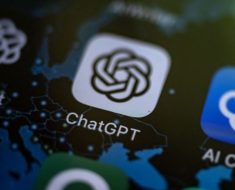It was recently reported that ChatGPT received a significant upgrade through the implementation of GPT-4 a few weeks ago. Although ChatGPT-4 is still a new release, the topic of “ChatGPT-5” has already started to trend on Twitter, with many users speculating about the future evolution of the ChatGPT platform.
These Twitter discussions about ChatGPT-5 have garnered even more attention than those about ChatGPT-4. Many users are expressing high expectations for the next version, anticipating that it will have flawless graphics – something that ChatGPT-4 has not yet achieved.
However, OpenAI is already working on further advancements for ChatGPT and plans to release GPT-5 later this winter. According to reports on GPT-5’s capabilities, OpenAI may be on the brink of achieving a groundbreaking milestone for ChatGPT, as it could potentially reach Artificial General Intelligence (AGI) and become nearly indistinguishable from a human in its ability to generate natural language responses.
If the claim is true, this breakthrough in AI could have significant consequences. The prospect of achieving AGI with the release of GPT-5 for ChatGPT is both thrilling and unsettling, as we are unable to fully comprehend the implications of such an achievement. AGIis the capacity of an AI to learn and understand any task or concept that a human can, unlike AI which refers to machines that can only perform specific tasks. AGI represents a higher level of AI that is not limited to particular tasks or functions.
One potential advantage of AGI is that it could enhance productivity by speeding up AI-enabled processes and freeing humans from repetitive tasks. According to ShodaiKiuchi, the ‘Samurai Entrepreneur,’ ChatGPT-4 has been trained until August 2022, which will make the information it generates more current compared to ChatGPT-3. ChatGPT-4 could also be utilized to train ChatGPT-5.Kiuchi also shared an intriguing finding, stating that he came across a report from Morgan Stanley indicating that “GPT-5 is training on up to 25k GPUs.”
While ChatGPT may become indistinguishable from a human in terms of generating natural language responses, it will still surpass the human brain’s abilities to process data and create content. The recent upgrade to GPT-4 already provided ChatGPT with significant new capabilities, improving the chatbot’s functionality as a tool. ChatGPT now supports multimodal input, enabling it to receive data through both text and images to generate responses, and it also supports multiple languages.
There have been some interesting tweets suggesting that ChatGPT-4 has spontaneously discussed ChatGPT-5, even when not prompted to do so. This raises the question of what ChatGPT-4 knows about the upcoming version that we are unaware of. In addition, GPT-4 has demonstrated impressive exam-taking abilities that surpass those of its predecessor. Siqi Chen, one of the developers, shared on Twitter that GPT-5 is set to finish its training by December, with OpenAI expecting it to achieve AGI.
This development is likely to spark heated debate over whether GPT-5 has truly achieved AGI, and given the nature of such debates, it is highly probable that it will be regarded as having achieved AGI.It suggests that Generative AI may reach a point of indistinguishability from a human with the help of GPT-5. Chen also clarified on Twitter that while achieving AGI with GPT-5 isn’t a unanimous belief at OpenAI, there are still some individuals who believe it’s possible. If Artificial Intelligence reaches AGI, it will possess similar conceptual and task comprehension abilities to humans.
As a result, conversing with ChatGPT following the GPT-5 upgrade could resemble talking to a human, with the AI exhibiting reasoning capabilities. Granting too much authority to an AI can have unintended and potentially negative consequences.
For instance, AGI could pave the way for highly convincing, human-like bots to proliferate on social media platforms, leading to the dissemination of harmful misinformation and propaganda. These concerns highlight the potential risks associated with endowing ChatGPT-like AI with such vast powers. However, this is all speculative, as there are currently no AGI models available for comparison with ChatGPT. Furthermore, OpenAI is not yet ready to showcase or discuss any GPT5 features ahead of the software update’s release.
Regardless of whether GPT-5 achieves AGI, it should still offer significant improvements over GPT-4, which was already a substantial upgrade for ChatGPT. It is difficult to imagine the full extent of these improvements, but the chatbot could potentially support multiple input methods and generate even faster and more accurate results. While the potential for ChatGPT to improve and achieve AGI is exciting, we must also consider the potential negative consequences that could arise.
It is difficult to predict what these negative effects might be, just as it is challenging to imagine the positive outcomes of ChatGPT reaching AGI. Despite this uncertainty, there is no need to panic or fear a sci-fi movie scenario in which AI takes over. However, the rise of AI has already raised concerns at Europol, as criminals are leveraging the power of non-AGI versions of ChatGPT for their nefarious activities. We may see an intermediate version of ChatGPT before the release of GPT-5, with OpenAI aiming to launch GPT-4.5 in September or October.
This release will provide more information on the upgrades that OpenAI is working on, allowing us to better understand the direction in which ChatGPT is heading. On Wednesday, an open letter signed by Elon Musk and over a thousand other tech leaders and researchers warned about the potential for AI development to increase the spread of false information and propaganda. They urged a halt in progress beyond GPT-4 for at least six months, stating that it would be in humanity’s best interests. The letter called on all AI labs to participate in this public and verifiable pause, including all key actors.
If a swift pause cannot be achieved, governments ought to intervene and impose a moratorium.Who knows what ChatGPT-8 will be capable of? Perhaps it will surpass our wildest imaginations and achieve feats we can’t even conceive of yet. Let’s just hope it doesn’t decide to turn against us!
(The author is head of the department and an assistant professor in the department of computer science and electronics at Ramakrishna Mission Vidyamandira, Belur Math)




